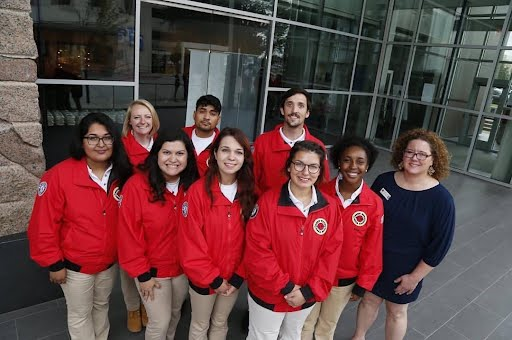
Christina Filippakos, first row, third from the left, with her City Year Tulsa team in 2016.
Editor’s Note: March is Social Work Month, and the theme this year is “Social Work Breaks Barriers.”
Family & Children’s Services Christina Filippakos’ journey as a social worker started after graduation from the University of Connecticut in 2016. Her commitment to service began at City Year (an AmeriCorps program) from August 2016 to June 2017, when she worked at Sequoyah Elementary School in Tulsa.
“I had a friend who had done City Year in the past who encouraged me to apply,” she said. “I got an e-mail from a recruiter. I then applied for the location that is most needed, and (City Year) sent me to Tulsa. I had no idea where Tulsa was. Nothing about Oklahoma. I knew it looked like a pot on the stove. Hmm … I thought I was going to Tucson. OK, well, this is going to be a culture shock. I did not know anybody in Tulsa at all. Not a soul, right? So, I just went.”
City Year members, who range from 18 to 25 years old, serve in schools all day, every day, preparing students with the social, emotional, and academic skills and mindsets to succeed in school and in life. According to the City Year website, members serve as student success coaches, supporting the development, growth, and success of students in systemically under-resourced schools, while cultivating skills to be leaders in their communities and careers.
AmeriCorps members who start service at the beginning of the school year (in August or September, depending on local school schedules) go through Basic Training Academy (BTA) — a month-long onboarding experience and introduction to City Year. Corps members learn about the history and evolution of the organization, youth development strategies, and our in-school service model. They are also assigned to their teams and school communities during BTA. According to the latest alumni survey11, half of AmeriCorps members — 44% — remain in the community where they served, contributing to the local economy, workforce, and social fabric.
“In City Year, you’re tutoring students in the areas of math and English, and coaching them in the areas of social, emotional, learning and attendance,” Filippakos said. “And then, we also helped support the schools by doing tier-one things like scheduling parent engagement events and decorating educational bulletin boards just to improve school culture. We were there to offer support to the teachers.”
She also worked as a team leader at City Year Boston from 2017-2018. She led a team of 12 AmeriCorps members through their year of service at the Blackstone Innovation School in Boston’s South End neighborhood. She also implemented an independent after-school program for 50 children in third- through fifth grades.
“The experience made me want to be a social worker,” Filippakos said. “It was great to support kids in a way that was not prioritized in our education system. We prioritize test scores, but do we prioritize talking about a child? To see how their weekend was, to ask them how they are and to give them coping skills is fulfilling. I want to advocate for youth, and I want to empower youth. There are so many things that are risk factors, and schools are one of the biggest protective factors that we have.”
After serving in Boston, she obtained an AmeriCorps scholarship funded by the George Kaiser Family Foundation and enrolled in a master’s degree program in social work from the University of Oklahoma-Tulsa. She graduated in 2020.
“I took advantage of the opportunity and stayed here in the community,” Filippakos said. “That’s what got me to now working in the schools, seeing the dynamics and how the systems interact with each other.” She worked with the YMCA of Greater Tulsa Go Club at Sequoyah Elementary School for the next two years until the pandemic hit.
“I wanted to do early childhood because I studied human development and family studies at UConn with a concentration in early childhood, and I got to learn how important prevention work is. My first internship at Family & Children’s Services was with Women in Recovery so I got the other end of it. I want to help parents and their kids get a solid foundation and those regulation skills and coping skills that would set them up to be successful. I thought this was a cool niche to follow.”
As a social worker today, Filippakos said one of the biggest challenges social workers faces is that society does not prioritize humanity.
“The systems that are in place prioritize profit over humanity,” she said. “This work is important, but is it treated that way? Are social work and education and the health of our society prioritized? It’s not, and that is why there is no funding.”
These days, Filippakos shares her love of social work and her experience in the City Year program, and how it inspired her to become a social worker with other aspiring students who may be interested in joining the program.








